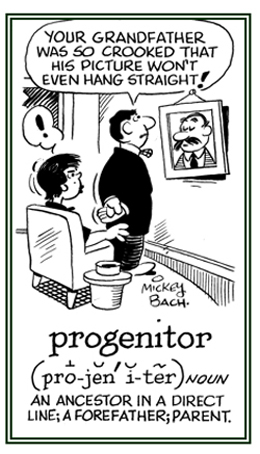geno-, gen-, genit-, gener-, -gen
(Greek > Latin: race, kind; line of descent; origin, creation; pertaining to sexual relations, reproduction, or heredity; and more recently, a gene or genes)
phylogenetical
phylogenetically
physiogenesis
The science of the beginning and development of the individual during the embryonic stage and, by extension, in several or even all preceding and subsequent stages of the life cycle.
phytogenesis
phytogenous
piezogene
Describing the formation of minerals largely under the influence of pressure.
polygenesis
Origin from more than one species, line of ancestors, or sources.
1. The legal or customary right of inheritance or succession by the firstborn son of a family: Because he and his wife only had daughters, Lord Seymore was puzzled about the custom of primogeniture in terms of the family estate.
2. The patrilineal mode of succession by which the right of inheritance pertains to the firstborn son of a family, to the exclusion of females: In older times, the lord of an estate might legally adopt a male child in order to preserve the custom of primogeniture when determining the terms of his will with respect to the inheritance of his property.
3. Etymology: from Latin, “firstborn”; from primus, “first” + genitura, “birth”.
2. The patrilineal mode of succession by which the right of inheritance pertains to the firstborn son of a family, to the exclusion of females: In older times, the lord of an estate might legally adopt a male child in order to preserve the custom of primogeniture when determining the terms of his will with respect to the inheritance of his property.
3. Etymology: from Latin, “firstborn”; from primus, “first” + genitura, “birth”.
1. An ancestor from the past who is related to someone who is living now: Adam is Eve's progenitor or her great grandfather.
2. Etymology: from Latin progenitor, "ancestor" from pro-, "forth" + gignere, "to produce, to beget."

© ALL rights are reserved.
Go to this Word A Day Revisited Index
2. Etymology: from Latin progenitor, "ancestor" from pro-, "forth" + gignere, "to produce, to beget."

Go to this Word A Day Revisited Index
so you can see more of Mickey Bach's cartoons.
psammogenous
psychogenesis
1. The origin and development of the mind; the formation of mental traits.
2. Origin within the mind or psyche.
2. Origin within the mind or psyche.
psychogenetic
1. Originating in the mind, as a disease.
2. Concernng the formation of mental traits.
2. Concernng the formation of mental traits.
ptarmigenous
ptyalogenous
Caused by the action of saliva.
puligenous


